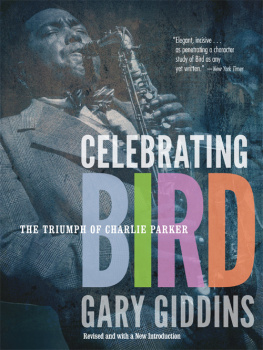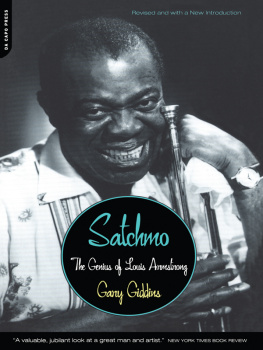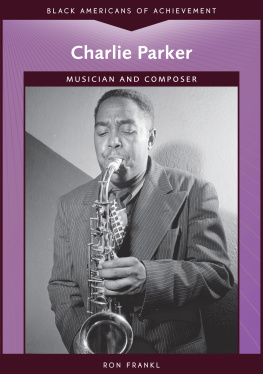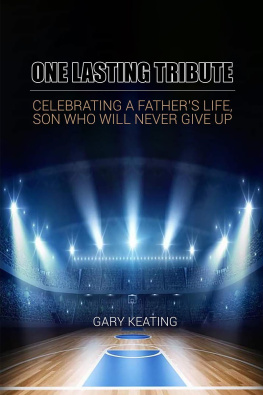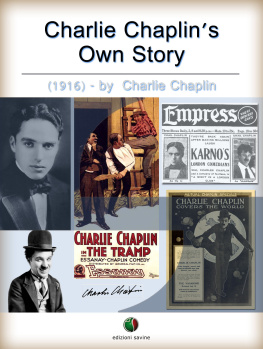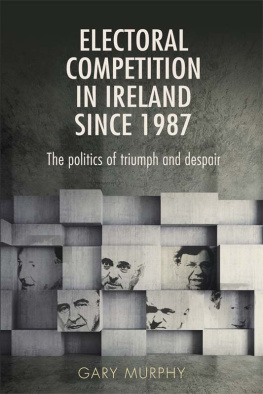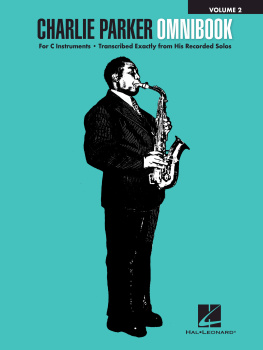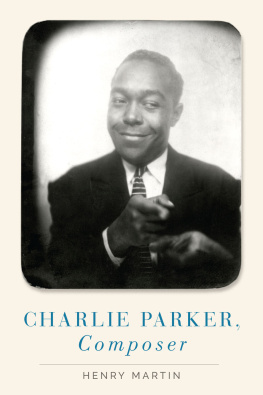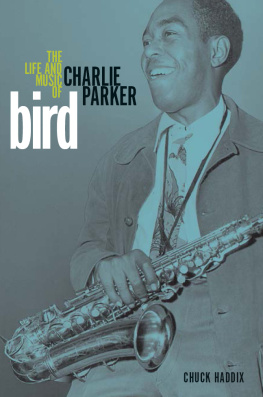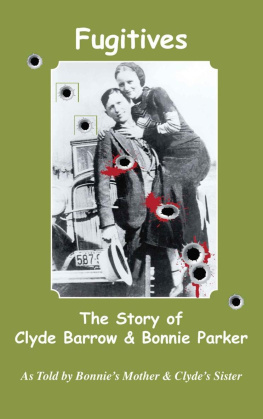Gary Giddins - Celebrating Bird: The Triumph of Charlie Parker
Here you can read online Gary Giddins - Celebrating Bird: The Triumph of Charlie Parker full text of the book (entire story) in english for free. Download pdf and epub, get meaning, cover and reviews about this ebook. year: 2013, publisher: University of Minnesota Press, genre: Non-fiction. Description of the work, (preface) as well as reviews are available. Best literature library LitArk.com created for fans of good reading and offers a wide selection of genres:
Romance novel
Science fiction
Adventure
Detective
Science
History
Home and family
Prose
Art
Politics
Computer
Non-fiction
Religion
Business
Children
Humor
Choose a favorite category and find really read worthwhile books. Enjoy immersion in the world of imagination, feel the emotions of the characters or learn something new for yourself, make an fascinating discovery.
- Book:Celebrating Bird: The Triumph of Charlie Parker
- Author:
- Publisher:University of Minnesota Press
- Genre:
- Year:2013
- Rating:4 / 5
- Favourites:Add to favourites
- Your mark:
- 80
- 1
- 2
- 3
- 4
- 5
Celebrating Bird: The Triumph of Charlie Parker: summary, description and annotation
We offer to read an annotation, description, summary or preface (depends on what the author of the book "Celebrating Bird: The Triumph of Charlie Parker" wrote himself). If you haven't found the necessary information about the book — write in the comments, we will try to find it.
Celebrating Bird: The Triumph of Charlie Parker — read online for free the complete book (whole text) full work
Below is the text of the book, divided by pages. System saving the place of the last page read, allows you to conveniently read the book "Celebrating Bird: The Triumph of Charlie Parker" online for free, without having to search again every time where you left off. Put a bookmark, and you can go to the page where you finished reading at any time.
Font size:
Interval:
Bookmark:
CELEBRATING BIRD first appeared in 1987 in an oversized format as part of a book and documentary film series produced by Toby Byron/Multiprises. At that time, we were locked into 128 pages and a strict deadline that resulted in a few excisions of content and a few baggy sentences that needed trimming. I am grateful to Erik Anderson and everyone at the University of Minnesota Press, notably production coordinator Rachel Moeller and editorial assistant Erin Warholm-Wohlenhaus, for the opportunity to modify and correct the text and to update the bibliography and discography. Sometimes, as Edward Albee wrote, youve got to go a long distance out of the way to come back a short distance correctly. I am much happier with this revised edition.
Back when I agreed to write this brief life, I consulted with my friend and colleague Stanley Crouch, who had been working for years on an exhaustive study of Parkers life and art. Shortly afterward, he dropped by my apartment toting a knapsack, which he emptied on the living room floor: an avalanche of cassette tapes of his interviews, and an act of extraordinary generosity. He said it was to help me get it right, and although I accessed only a fraction of his prodigious research, it led me in a different direction. Chiefly, it introduced me to Parkers first wife, Rebecca Parker Davis, whom Stanley interviewed extensively; until then, she had been ignored by jazz historians. In the first edition of this book, I predicted Stanleys biography would be a milestone in the literature of American music. In the intervening years, he has produced a body of work answering to that description. His Kansas City Lightning: The Rise and Times of Charlie Parker will be published by the time this book appears.
As the key to Parkers apprenticeship years, Rebecca had the story I wanted to tell, and from the time we met, her candor and enthusiasm confirmed my intention to focus on the mystery of how the unprepossessing son of Addie and Charles Parker Sr. came to be the legendary Bird of postwar America who revolutionized the music of his time. Rebeccas sharp memory re-created moments with photographic clarity, and she never hesitated to telephone when she recalled yet another incident that might help unravel the puzzle. Except for one incorrect concert date, which had us chasing our tails a while, her stories always checked out, and I trusted her implicitly.
The complexity of Parkers life is nowhere more apparent than in the conflicting claims of his remarkably diverse and devoted wives, legal and common law. I concentrated on Rebeccas perspective because my interest in his early years dovetailed with her resolve to nail down details and because it had been utterly neglected. In Ross Russells Bird Lives! , as much roman clef as biography, her name is misspelled. Of Parkers later wives, Geraldine Scott had died; Doris Sydnor had related her view in Robert Reisners Bird: The Legend of Charlie Parker; Chan Parker had related hers to Russell (she wrote the introduction to the French edition of Bird Lives! ) and in her massive photojournal To Bird with Love (compiled with Francis Paudras) and also in her memoir in progress, which appeared as Life in E-Flat in 1999. Doris declined to be interviewed; she said she had already told everything to Stanley. I did interview Chan, whom I found alternately charming and defensive.
Almost all my biographical material was drawn from or confirmed by original research, including that of Crouch and the oral history archive at the indispensable Institute of Jazz Studies at Rutgers University. Nothing in this project proved more gratifying than conversing about Parker with those who knew him or had firsthand knowledge of him. Most are now gone. I am blessed to have known them all: Muhal Richard Abrams, David Amram, Benny Carter, Maxwell T. Cohen, Al Cohn, Earl Coleman, Ted Curson, Rebecca Parker Davis, Buddy DeFranco, Bevan Dufty, William Dufty, Gil Evans, Leonard Feather, Dizzy Gillespie, Ira Gitler, Dexter Gordon, Johnny Griffin, Dr. H., Al Haig, Roland Hanna, Roy Haynes, Woody Herman, Budd Johnson, Hank Jones, Thad Jones, Lee Konitz, John Lewis, Rolf Ljungquist, Jay McShann, Dan Morgenstern, Gerry Mulligan, Joe Newman, Big Nick Nicholas, Chan Parker, Art Pepper, Roy Porter, Robert Reisner, Red Rodney, Don Schlitten, Ed Shaughnessy, Buddy Tate, Mary Lou Williams, Phil Woods. I benefited from the research assistance of Angela Gaudioso, Norman Saks, Ira Berger, Steve Futterman, and Burt Korall, as well as the Institute of Jazz Studies, administered by Dan Morgenstern, Ed Berger, and Marie Griffin; and the Schomburg Center for Black Studies, to which Ernie Smith bequeathed his great library of films.
Celebrating Bird features an extraordinary collection of photographs and illustrations keyed to the narrative; the list of photography credits speaks for itself, boasting masters of the art, among them Herman Leonard, William Claxton, Bob Parent, and William P. Gottlieb. Many thanks, as always, to my agents Georges and Anne Borchardt and Kate Johnson. Deborah Halper, to whom this book is dedicated, is my guiding hand in everything. Our daughter Lea Giddins was not yet born and Elora Beth Duffer (19722013) had not yet become my indispensable assistant and friend of fourteen years when the first edition of this book was published, but they have played a role in everything that followed, including this revised edition.
I continue to celebrate the genius of Charlie Parker. Ever since I heard the album Bird Symbols twenty-threeno, make that fiftyyears ago, his music has been a bottomless source of pleasure and a faithful paradigm of cultural endeavor.
G. G.
August 2013
THE LITERATURE on Charlie Parker is voluminous and growing. This bibliography includes works accessed in the writing of Celebrating Bird along with relevant books that appeared in the intervening years.
Amram, David. Vibrations . New York: Macmillan, 1968.
Balliett, Whitney. Bird. New Yorker , March 1, 1976.
Brown, Tony. Interview with Baroness de Koenigswarter. Melody Maker , February 16, 1957.
Chambers, Jack. Milestones 1 . New York: Beech Tree/Morrow, 1983.
Coda , no. 181, December 1981. Various writers.
Collier, James Lincoln. The Making of Jazz . New York: Houghton Mifflin, 1978.
Crouch, Stanley. Considering Genius . New York: Basic Civitas Books, 2006.
Crow, Bill. From Birdland to Broadway . New York: Oxford University Press, 1992.
Dance, Stanley. The World of Count Basie . New York: Scribners, 1980.
. The World of Earl Hines . New York: Scribners, 1977.
DeVeaux, Scott. The Birth of Bebop: A Social and Musical History . Berkeley: University of California Press, 1999.
Dexter, Dave, Jr. The Jazz Story . New York: Prentice-Hall, 1964.
Down Beat , March 11, 1965. Various writers.
Dufty, Maely Daniele. The Bird Has Flown but Not the Vultures. New York Citizen Call , July 23, 1960.
Ellison, Ralph. Shadow and Act . New York: Random House, 1964.
Feather, Leonard. Inside Jazz . New York: Robbins, 1949.
. Parker Finally Finds Peace. Down Beat , April 10, 1955.
. Yardbird Flies Home. Metronome , August 1947.
Giddins, Gary. Riding on a Blue Note . New York: Oxford University Press, 1981.
. Visions of Jazz: The First Century . New York: Oxford University Press, 1998.
Giddins, Gary, and Scott DeVeaux. Jazz . W. W. Norton, 2009.
Gillespie, Dizzy, and Al Fraser. To Be or Not to Bop . New York: Doubleday, 1979.
Gitler, Ira. Jazz Masters of the 40s . New York: Macmillan, 1966. The reprint has a new introduction and discography. New York: Da Capo Press, 1984.
. Swing to Bop . New York: Oxford University Press, 1985.
Harrison, Max. Charlie Parker . New York: A. S. Barnes, 1961.
Font size:
Interval:
Bookmark:
Similar books «Celebrating Bird: The Triumph of Charlie Parker»
Look at similar books to Celebrating Bird: The Triumph of Charlie Parker. We have selected literature similar in name and meaning in the hope of providing readers with more options to find new, interesting, not yet read works.
Discussion, reviews of the book Celebrating Bird: The Triumph of Charlie Parker and just readers' own opinions. Leave your comments, write what you think about the work, its meaning or the main characters. Specify what exactly you liked and what you didn't like, and why you think so.

